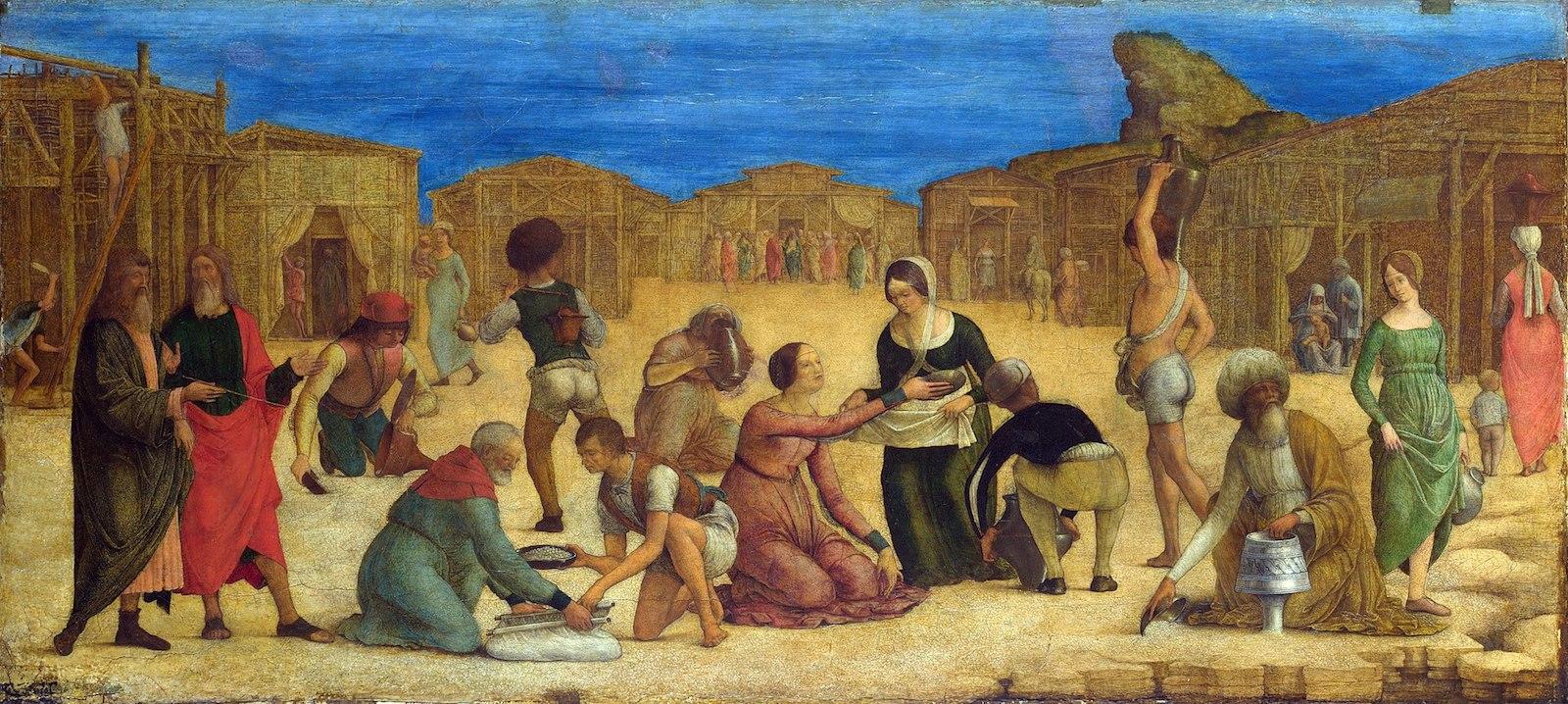Commentary on Parashat Beshalach, Exodus 13:17-17:16
The Israelites leave Egypt after the final plagues force Pharaoh to surrender; however, once the Israelites have left their slavery, Pharaoh has a change of heart and decides to chase after them with his army. The Israelites come to the Sea of Reeds, but are able to cross on dry land after God parts the waters, which then come together and drown the pursuing Egyptian army. Moses sings his “Song of the Sea,” and Miriam leads the women in dance and rejoicing.
Still, the people are dissatisfied with conditions in the wilderness, and repeatedly complain, despite the fact that God provides them with “manna” and water. At the end of the parsha, there is a dramatic battle with the nation Amalek.
In Focus
“God said to Moses: ‘See here, I will rain down for them food from heaven, and the people will go out and collect a daily portion every day. Thus I will test them, whether they will follow My Torah or not'” (Exodus 16:5).
Pshat
The Hebrew people have escaped to freedom in the wilderness only to find that there is no food or water in the desert; they complain and even nostalgically recall the food they ate in Egypt as slaves. They seem to blame Moses for their troubles; he, in turn, reminds them that it was God who took them out of Egypt.
With your help, My Jewish Learning can provide endless opportunities for learning, connection and discovery.
God responds that God will provide food from heaven–the “manna”–as much as each person needs, with a double portion on Fridays so that the people do not need to gather on Shabbat. Each day the manna will fall, and whatever is left over will go bad; the people must collect their portion every day, and not attempt to hoard it.
Drash
The 15th-century Sephardic [Spanish or Mediterranean] Torah commentator R. Yitzhak Abarvanel notices a fundamental problem with this verse: When we say that someone is being “tested,” we assume that they are going to have to do something difficult. The classic example from the Torah is in Genesis 22, when God “tested” Avraham by asking him to bring his son Yitzhak as a sacrifice.
However, as Abarvanel points out, God’s beneficence in providing the miraculous “food from heaven” seems like an act of lovingkindness, not a difficult challenge! What kind of test is it to provide someone with food and water that they simply collect without any trouble at all?
Nevertheless, the plain meaning of the verse is that God is giving Israel some kind of temptation or challenge. Rashi interprets the phrase “follow my Torah” as applying specifically to the instructions pertaining to the manna. Thus, for Rashi, the test that God gives the Israelites is whether they will follow the specific commandments not to leave the manna over till the next day, and not to go out collecting it on Shabbat. (See verses 16:19-27.)
Other commentators understand the test in broader terms. Ibn Ezra (11th-century Spain) understands the test in light of the first part of our verse, which says that one’s portion of manna must be collected every day. Ibn Ezra imagines God saying that the test is “so that they will rely on Me every day.”
Similarly, Ramban (Nachmanides) writes a long commentary on this verse, in which he expounds the drama of the Israelites’ situation. They were in the desert wilderness, a “wilderness of snakes and scorpions,” taken there out of slavery by an unfamiliar ancestral God, who each day provided a strange food that neither they nor their ancestors had ever seen before. The people didn’t know if this invisible God would in fact provide food every day; they only received it one day at a time, with no assurances for the future. Under those circumstances, writes Ramban, the test is whether they would follow God even if they only had one day’s supply of food.
Philosophically, then, Rashi sees the test as one of obedience, whereas Ramban sees the test as one of faith. However, either approach answers Abarvanel’s question — yes, providing the Israelites with sustenance is an act of beneficence, but these too can be tests.
To put it another way, the test of the Israelites was not a test of endurance or sacrifice, but a test of character under conditions of plenty. Freed from the need to work hard every day just to eat, would they grow spiritually, or would they become spiritually lazy?
Different aspects of this challenge can be inferred from the different commentator’s interpretations. Ibn Ezra says that the test for the Israelites was to rely on God every day; turned around, we can understand this as the challenge of practicing gratitude, of becoming alive to the wonder of our continued existence. Every day we can wake up and be thankful for what we have — or we can take our situation for granted, and forget the Source of All Life.
Following Ramban, we can ask ourselves how willing we are to take spiritual risks when the future is not assured — do we follow a Godly path despite the detours and unfamiliar terrain such a journey must inevitably entail? Do we demand absolute predictability — which, after all, is the one thing the Israelites had as slaves in Egypt — or are we willing to take things “one day at a time,” opening ourselves to faith?
Another commentator, Hizkuni (France, d.1250) quotes an interpretation that the test was to see if the Israelites would use their time to study Torah, now that they had leisure time on their hands. That question applies as directly to our age as it does to the Torah story under consideration. [What do we do with all the time saved from our modern “time-saving” devices? Do we watch another episode of ER, or use the time to make the world a better place or to grow spiritually?]
Finally, returning to Rashi, we can infer that gifts carry with them responsibilities. The manna was a gift from God, but God asked that it be treated with respect and reverence. Do we, in fact, appreciate with reverence the gifts we have been given, and act accordingly? If the manna was symbolic of the sustenance we all too often take for granted, we can ask ourselves if we give back to God, through acts of charity and compassion, some of what has been given to us.
To cultivate the quality of wonder; to practice gratitude; to act responsibly with all we’ve been given–that’s the test, every day.
Note: Yehuda Nachshoni’s book, which elucidates different Torah commentaries, was helpful to me in preparing this column; the specific chapter in Nachshoni that discusses these issues was pointed out to me by Rabbi Robert Wexler at the American Jewish University.
Provided by KOLEL–The Adult Centre for Liberal Jewish Learning, which is affiliated with Canada’s Reform movement.
Avraham
Pronounced: AHVR-rah-ham, Origin: Hebrew, Abraham in the Torah, considered the first Jew.
Sephardic
Pronounced: seh-FAR-dik, Origin: Hebrew, describing Jews descending from the Jews of Spain.
Torah
Pronunced: TORE-uh, Origin: Hebrew, the Five Books of Moses.
Yitzhak
Pronounced: eetz-KHAHK, Origin: Hebrew, Hebrew name for Isaac.



